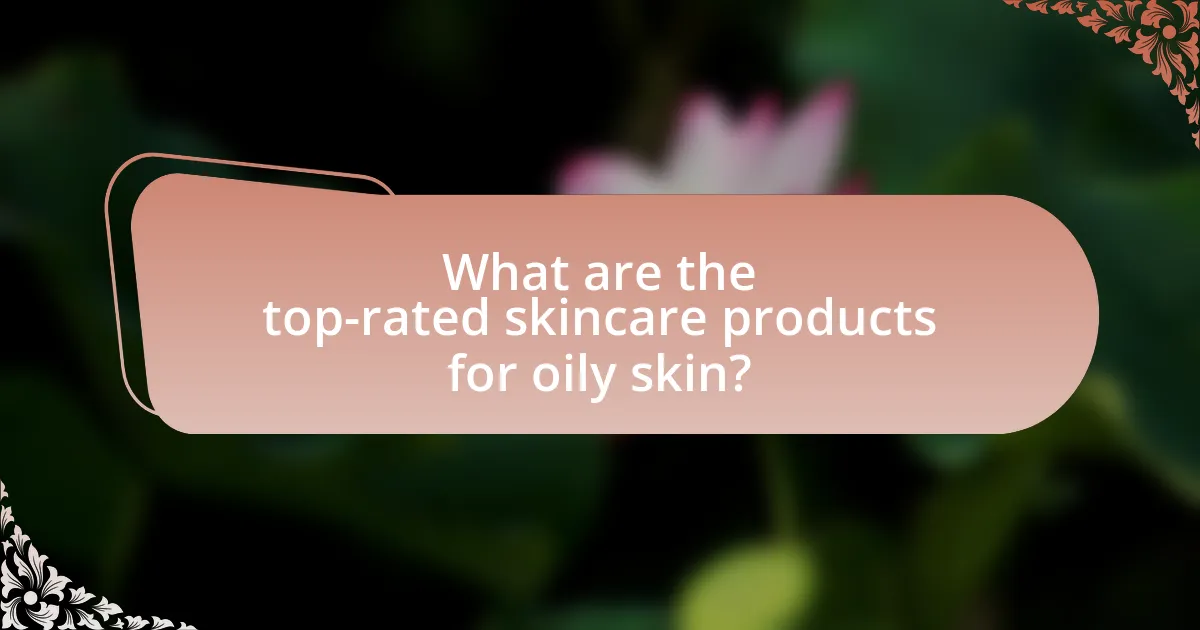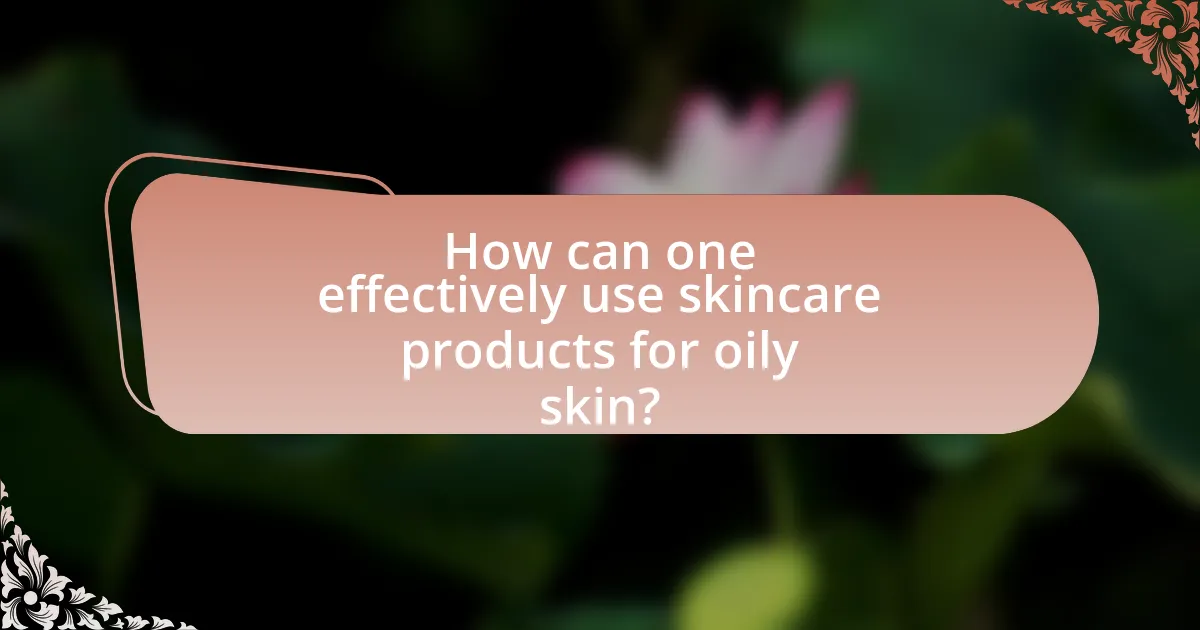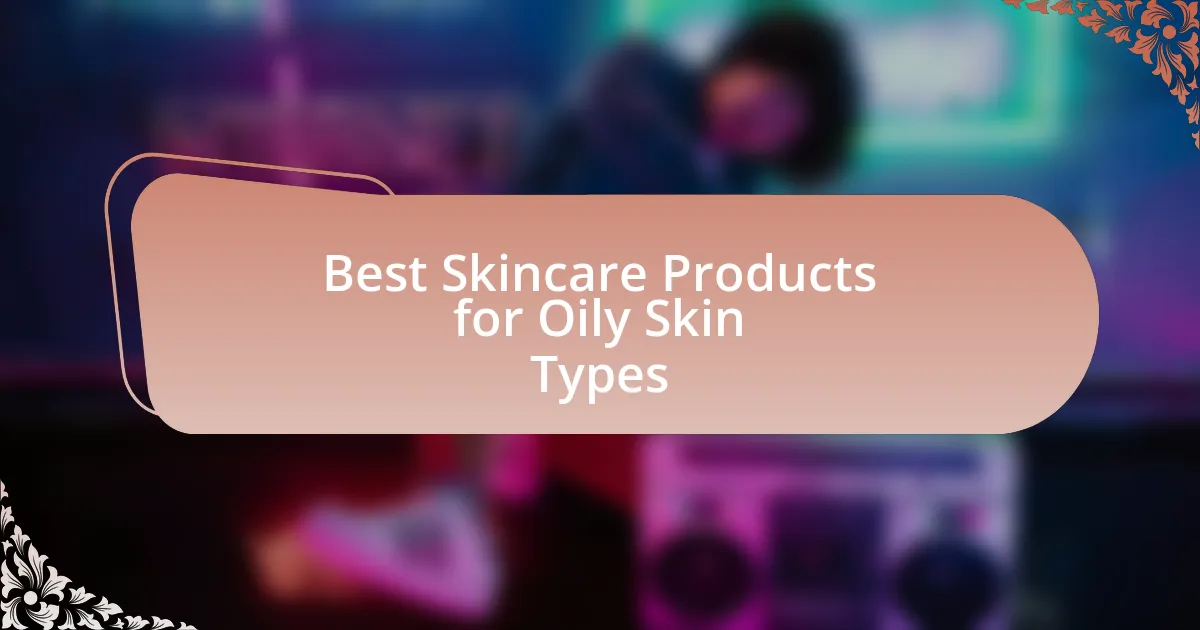The article focuses on the best skincare products for oily skin types, highlighting essential items such as gel-based cleansers, oil-free moisturizers, and non-comedogenic sunscreens. It explains the unique characteristics of oily skin, including excess sebum production and larger pores, which contribute to acne susceptibility. Key ingredients beneficial for oily skin, such as salicylic acid, niacinamide, and clay, are discussed, along with the importance of using lightweight, non-comedogenic formulations. The article also outlines effective skincare routines, product application order, and common mistakes to avoid, providing a comprehensive guide for managing oily skin effectively.

What are the Best Skincare Products for Oily Skin Types?
The best skincare products for oily skin types include gel-based cleansers, oil-free moisturizers, and non-comedogenic sunscreens. Gel-based cleansers, such as those containing salicylic acid, effectively remove excess oil and prevent breakouts. Oil-free moisturizers, like those with hyaluronic acid, hydrate the skin without adding extra oil. Non-comedogenic sunscreens, which do not clog pores, are essential for protecting oily skin from UV damage while maintaining a lightweight feel. These products are specifically formulated to balance oil production and minimize shine, making them ideal for individuals with oily skin.
How do oily skin types differ from other skin types?
Oily skin types differ from other skin types primarily due to the overproduction of sebum, which leads to a shiny appearance and increased susceptibility to acne. This excess oil can result from factors such as hormonal changes, genetics, and environmental influences. Unlike dry or normal skin types, which may lack moisture and have smaller pores, oily skin typically features larger pores and a thicker texture. Research indicates that individuals with oily skin often experience more frequent breakouts, as the excess oil can trap dirt and bacteria, leading to clogged pores.
What characteristics define oily skin?
Oily skin is characterized by an excess production of sebum, leading to a shiny appearance, particularly in the T-zone (forehead, nose, and chin). This skin type often presents enlarged pores, a thick or coarse texture, and is prone to acne and breakouts due to clogged pores. The overactivity of sebaceous glands is a primary factor contributing to these characteristics, which can be influenced by hormonal changes, genetics, and environmental factors.
How does oily skin affect skincare needs?
Oily skin requires specific skincare needs due to its tendency to produce excess sebum, which can lead to clogged pores and acne. Individuals with oily skin should prioritize lightweight, non-comedogenic products that do not exacerbate oiliness or cause breakouts. For instance, gel-based cleansers and oil-free moisturizers are effective in managing oil levels without adding extra shine. Research indicates that using salicylic acid can help reduce acne by penetrating and clearing clogged pores, making it a beneficial ingredient for oily skin types.
What ingredients should be sought in skincare products for oily skin?
Skincare products for oily skin should contain ingredients like salicylic acid, niacinamide, and clay. Salicylic acid is a beta hydroxy acid that penetrates pores to reduce oil and prevent acne, making it effective for oily skin types. Niacinamide helps regulate sebum production and improves skin texture, while clay absorbs excess oil and impurities, providing a mattifying effect. These ingredients are widely recognized in dermatological studies for their efficacy in managing oily skin conditions.
Which active ingredients help control oil production?
Salicylic acid, niacinamide, and benzoyl peroxide are active ingredients that help control oil production. Salicylic acid penetrates pores to reduce excess sebum and prevent acne, while niacinamide regulates oil production and improves skin texture. Benzoyl peroxide kills acne-causing bacteria and reduces inflammation, further aiding in oil control. These ingredients are commonly found in skincare products designed for oily skin types, making them effective choices for managing oiliness and preventing breakouts.
How do exfoliants benefit oily skin types?
Exfoliants benefit oily skin types by removing excess sebum and dead skin cells, which helps prevent clogged pores and reduces the likelihood of acne breakouts. Regular exfoliation can enhance skin texture and promote a clearer complexion by facilitating cell turnover. Studies indicate that chemical exfoliants, such as salicylic acid, penetrate oil-filled pores, effectively dissolving impurities and reducing inflammation associated with oily skin. This targeted action not only helps in managing oiliness but also improves the overall appearance of the skin.
What types of products are essential for oily skin care?
Essential products for oily skin care include oil-free cleansers, lightweight moisturizers, exfoliants containing salicylic acid, and non-comedogenic sunscreens. Oil-free cleansers help remove excess oil without stripping the skin, while lightweight moisturizers provide hydration without clogging pores. Exfoliants with salicylic acid penetrate pores to reduce acne and prevent breakouts. Non-comedogenic sunscreens protect the skin from UV damage without contributing to oiliness. These products are specifically formulated to address the unique needs of oily skin, ensuring effective care and maintenance.
What role do cleansers play in managing oily skin?
Cleansers play a crucial role in managing oily skin by removing excess sebum, dirt, and impurities that can lead to breakouts. Effective cleansers, particularly those containing ingredients like salicylic acid or benzoyl peroxide, help to unclog pores and reduce oiliness. Research indicates that regular use of appropriate cleansers can significantly decrease acne lesions and improve overall skin texture, as shown in studies published in the Journal of Clinical and Aesthetic Dermatology.
How do toners contribute to oily skin care routines?
Toners contribute to oily skin care routines by helping to balance oil production and minimize the appearance of pores. They often contain astringent ingredients like witch hazel or salicylic acid, which can reduce excess sebum and prevent breakouts. Studies have shown that using toners with these active ingredients can lead to a clearer complexion and improved skin texture, making them an essential step in managing oily skin.
What moisturizers are suitable for oily skin types?
Moisturizers suitable for oily skin types include gel-based and oil-free formulations. These products are designed to hydrate the skin without adding excess oil, which can lead to breakouts. Ingredients such as hyaluronic acid, glycerin, and salicylic acid are effective in providing moisture while controlling oil production. For example, Neutrogena Hydro Boost Water Gel contains hyaluronic acid and is non-comedogenic, making it a popular choice for oily skin. Additionally, Clinique Dramatically Different Hydrating Jelly is another option that offers lightweight hydration without clogging pores.
How can one choose the right skincare products for oily skin?
To choose the right skincare products for oily skin, one should look for non-comedogenic formulations that help control excess oil without clogging pores. Ingredients such as salicylic acid, which penetrates pores to reduce oil and prevent breakouts, and niacinamide, known for its oil-regulating properties, are effective. Additionally, lightweight, gel-based moisturizers can hydrate the skin without adding extra oil. Research indicates that products containing these ingredients can significantly improve skin texture and reduce acne in individuals with oily skin types.
What factors should be considered when selecting products?
When selecting skincare products for oily skin types, key factors include ingredient composition, non-comedogenic properties, and pH balance. Ingredient composition is crucial; products should contain oil-absorbing ingredients like salicylic acid or clay, which help control excess sebum production. Non-comedogenic properties ensure that the products do not clog pores, reducing the risk of acne breakouts. Additionally, maintaining a balanced pH is important, as products that are too alkaline can disrupt the skin’s natural barrier, leading to increased oiliness. Research indicates that formulations with these characteristics are more effective for managing oily skin, as they address the specific needs of this skin type.
How can skin sensitivity influence product choice?
Skin sensitivity significantly influences product choice by necessitating the selection of formulations that minimize irritation and allergic reactions. Individuals with sensitive skin often prefer products labeled as hypoallergenic, fragrance-free, and non-comedogenic to avoid exacerbating their condition. Research indicates that approximately 60% of individuals with sensitive skin report adverse reactions to common skincare ingredients, highlighting the importance of careful ingredient selection. Therefore, consumers with skin sensitivity are more likely to choose products specifically designed for their skin type, ensuring compatibility and reducing the risk of negative effects.

What are the top-rated skincare products for oily skin?
The top-rated skincare products for oily skin include gel-based cleansers, lightweight moisturizers, and oil-free sunscreens. Notable examples are Neutrogena Oil-Free Acne Wash, which contains salicylic acid to help prevent breakouts, and La Roche-Posay Effaclar Mat, a mattifying moisturizer that controls shine. Additionally, the EltaMD UV Clear Broad-Spectrum SPF 46 is highly recommended for its oil-free formula that protects against UV rays while being suitable for acne-prone skin. These products are favored for their effectiveness in managing oil production and preventing acne, supported by positive user reviews and dermatologist recommendations.
Which cleansers are recommended for oily skin types?
Cleansers recommended for oily skin types include gel-based cleansers, foaming cleansers, and salicylic acid cleansers. Gel-based cleansers effectively remove excess oil without over-drying the skin, while foaming cleansers help to deeply cleanse pores. Salicylic acid cleansers are particularly beneficial as they penetrate the skin to dissolve excess sebum and prevent breakouts. Studies indicate that products containing these formulations can significantly reduce oiliness and improve skin clarity.
What features make a cleanser effective for oily skin?
An effective cleanser for oily skin should contain ingredients that control excess oil production, such as salicylic acid or benzoyl peroxide, which help to unclog pores and reduce acne. Additionally, a good cleanser should have a lightweight, non-comedogenic formula that does not add extra oil to the skin. Gel-based or foaming cleansers are often preferred as they provide a deep clean without leaving a greasy residue. Studies have shown that salicylic acid can penetrate oil-filled pores, making it particularly effective for oily skin types.
What toners are best for oily skin management?
The best toners for oily skin management include those containing witch hazel, salicylic acid, and tea tree oil. Witch hazel is known for its astringent properties, which help reduce excess oil and minimize pores. Salicylic acid is effective in exfoliating the skin and preventing acne, making it ideal for oily skin types. Tea tree oil possesses antibacterial properties that can help combat acne and soothe inflammation. These ingredients have been widely recognized in dermatological studies for their efficacy in managing oily skin and preventing breakouts.
How do toners help in reducing excess oil?
Toners help in reducing excess oil by containing astringent ingredients that tighten pores and decrease oil production. These astringents, such as witch hazel and salicylic acid, effectively remove excess sebum from the skin’s surface, leading to a matte finish. Studies have shown that products with these ingredients can significantly lower oiliness, making them beneficial for individuals with oily skin types.
What moisturizers are ideal for oily skin types?
Moisturizers ideal for oily skin types are lightweight, oil-free, and non-comedogenic formulations. These products often contain ingredients like hyaluronic acid, glycerin, and salicylic acid, which hydrate the skin without adding excess oil. For example, gel-based moisturizers such as Neutrogena Hydro Boost Gel-Cream and Clinique Dramatically Different Hydrating Jelly are specifically designed to provide moisture while controlling shine. Studies indicate that using the right moisturizer can help balance oil production and improve skin texture, making these formulations effective for individuals with oily skin.
What ingredients should be avoided in moisturizers for oily skin?
Moisturizers for oily skin should avoid heavy oils, silicones, and alcohol-based ingredients. Heavy oils, such as coconut oil and olive oil, can clog pores and exacerbate oiliness. Silicones, like dimethicone, may create a barrier that traps excess oil and lead to breakouts. Alcohol-based ingredients can strip moisture, prompting the skin to produce more oil in response. Studies indicate that formulations containing these ingredients can worsen acne and increase shine, making them unsuitable for oily skin types.

How can one effectively use skincare products for oily skin?
To effectively use skincare products for oily skin, one should select non-comedogenic products that help control excess oil without clogging pores. This includes using gel-based cleansers, lightweight moisturizers, and oil-free sunscreens. Research indicates that ingredients like salicylic acid and niacinamide can reduce oiliness and prevent breakouts, making them ideal for oily skin types. Additionally, incorporating a regular exfoliation routine with products containing alpha-hydroxy acids can help remove dead skin cells and prevent pore blockage, further managing oil production.
What is the proper order of application for oily skin products?
The proper order of application for oily skin products is: cleanser, toner, treatment (such as serums), moisturizer, and sunscreen. This sequence ensures that each product effectively penetrates the skin and performs its intended function. Cleansing removes excess oil and impurities, toning balances the skin’s pH, treatments target specific concerns like acne, moisturizers hydrate without clogging pores, and sunscreen protects against UV damage. Following this order maximizes the benefits of each product, leading to healthier skin.
How does layering products affect oily skin?
Layering products can exacerbate oily skin by increasing the likelihood of clogged pores and excess oil production. When multiple products are applied, especially those that are heavy or occlusive, they can create a barrier that traps oil and impurities, leading to breakouts. Research indicates that using lightweight, non-comedogenic formulations is crucial for oily skin types to prevent these adverse effects. For instance, a study published in the Journal of Dermatological Treatment emphasizes that oil-free moisturizers and serums help maintain hydration without contributing to oiliness, thus supporting the management of oily skin effectively.
What tips can enhance the effectiveness of oily skin products?
To enhance the effectiveness of oily skin products, it is essential to choose non-comedogenic formulations that do not clog pores. Non-comedogenic products are specifically designed to prevent acne and breakouts, making them ideal for oily skin. Additionally, incorporating ingredients like salicylic acid, which penetrates pores to reduce oil and prevent acne, can significantly improve results. Studies have shown that salicylic acid effectively reduces acne lesions by 50% within 12 weeks of consistent use. Regular exfoliation with gentle chemical exfoliants, such as glycolic acid, can also help remove excess oil and dead skin cells, promoting clearer skin. Furthermore, applying products in the correct order—starting with lighter, water-based formulations and layering heavier products as needed—ensures optimal absorption and effectiveness.
How often should products be applied for optimal results?
For optimal results, skincare products for oily skin types should generally be applied twice daily, once in the morning and once at night. This frequency allows for consistent treatment of excess oil and helps maintain skin balance. Dermatological studies indicate that regular application of targeted products, such as salicylic acid or benzoyl peroxide, can significantly reduce acne and oiliness when used consistently over time.
What common mistakes should be avoided in oily skin care?
Common mistakes to avoid in oily skin care include using harsh cleansers, skipping moisturizer, and over-exfoliating. Harsh cleansers can strip the skin of natural oils, leading to increased oil production as the skin compensates. Skipping moisturizer can cause dehydration, prompting the skin to produce more oil. Over-exfoliating can irritate the skin and disrupt its barrier, resulting in more oiliness. These practices are counterproductive and can exacerbate oily skin issues.
What are the best practices for maintaining oily skin health?
To maintain oily skin health, it is essential to follow a consistent skincare routine that includes cleansing, exfoliating, moisturizing, and using targeted treatments. Cleansing twice daily with a gentle, oil-free cleanser helps remove excess oil and prevent clogged pores. Exfoliating 1-2 times a week with a chemical exfoliant, such as salicylic acid, can help remove dead skin cells and reduce breakouts. Moisturizing with a lightweight, non-comedogenic moisturizer ensures hydration without adding extra oil. Additionally, incorporating products with ingredients like niacinamide or tea tree oil can help regulate oil production and minimize the appearance of pores. These practices are supported by dermatological studies indicating that proper skincare routines can significantly improve oily skin conditions and reduce acne prevalence.


